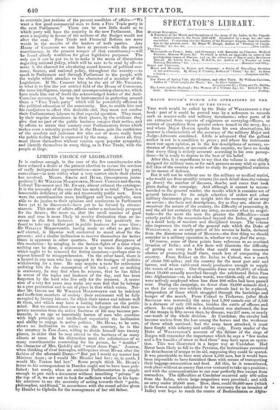LIMITED CHOICE OF LEGISLATORS.
IT is curious enough, in the case of the few constituencies who have evinced a desire at the present election to secure the services of really independent representatives—men unfettered by party connexions—to note within what a very narrow circle their choice has revolved. Messrs. GROTE and HUME, (incongruous juxta- position !) Sir WILLIAM MOLESWORTH, Messrs. COBDEN and SMITH, Colonel THOMPSON and Mr. EWART, almost exhaust the catalogue. It is the necessity of the case that has made it so brief. There is a lamentable deficiency of able and trustworthy public men. Even were the constituencies more intelligent and less apathetic, men able to do justice to their opinions and sentiments in Parliament have yet to be discovered—have yet to be formed by circum- stances. This state of affairs affords rather a melancholy prospect for the future ; the more so, that the small number of good men and true is more likely te; receive diminution than an in- crease in the first instance. Mr. Gaol's has positively re- fused to take any further part in public business for some time ; Sir WILLIAM MoLsswoarti, having made no effort to get him- self elected, is likewise well contented to stand aloof for the present ; and a similar inclination to reserve themselves for better times is apparent in other quarters. We cannot disapprove of this resolution : by mingling in the faction-fights of a time when nothing can be done, a statesman is apt to waste his energies, -which ought to be reserved for fitting occasions—perhaps also to expose himself to misapprehension. On the other hand, tbere is a hazard in any man who has engaged in the busiqgss of politics withdrawing for a time. He may acquire a taste Tor retirement unfitting him for the resumption of his task ; and as nothing is stationary, he may find when he returns, that he has fallen in arrear of the topics and business of the day, and has been forgotten by the herd who live only for the moment. A seces- sion of a very few years may make any man feel that he belongs to a past generation and is out of place in that which exists. Nei- ther.Mr. GROTE nor Sir Wirmuni MOLESWORTH can be indolent and inefficient members of society : their retirement will be fully occupied by literary labours, for which their tastes and talents well tit them, and which may have a lasting influence on the public mind. But we cannot close our eyes to the danger that their tem- porary secession from the active business of life may become per- manent, in an age so lamentably barren of men who combine 'with high principle and intellectual superiority the inclination and ability to engage in active politics. Mr. Hums, to be sure, shows no inclination to retire : on the contrary, he is like the attorney in Tom Jones, willing to divide himself into twenty pieces, in order that he may attend to the business of as many clients at once. In his distraction amid the solicitations of so many constituencies contending for his person, he " doubles " the character of Mrs. Quickly and "sweet Anne Page." JOSEPH, when thinking of rival boroughs, soliloquizes about HUME after the fashion of the aforesaid Dame—" But yet I would my master had Mistress Anne ; or I would Mr. Slender had her ; or, in sooth, I would Mr. Fenton had her." Some people think Mr. Humes letter to his correspondent in Dundee ought not to have been pub- lished: but surely, when an eminent Parliamentarian is simple enough to pen such a document without inscribing "private" at the top of it, we are not to look,for sufficient wisdom in his hum- ble admirers to see the necessity of acting towards their "guide, philosopher, and friend," in accordance with the sound advice given by Hamlet to Ophelia for the management of her old father.


























 Previous page
Previous page